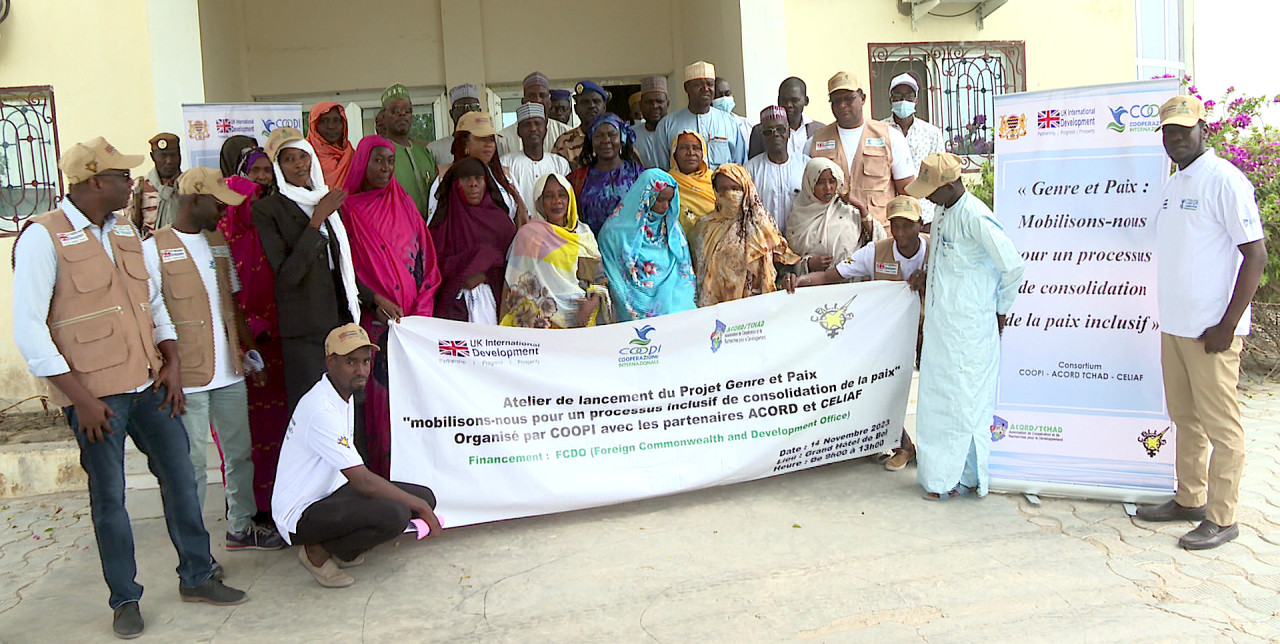25-03-2024 | di COOPI
Lake Chad: analyzing conflicts with a gender perspective
On February 8, 2024, COOPI-Cooperazione Internazionale organized a dialogue workshop in Bol, Chad (Lake Region), on the values of peace, peaceful coexistence, social cohesion, and capacity building of women's organizations. The conference brought together stakeholders on gender conflicts in Lake Chad Province, including local authorities (administrative, traditional, and religious), women and youth, and community leaders.
During the conference, the international consultant, Talla Marius, presented to COOPI and other stakeholders the results of the gender-sensitive conflict analysis. As conflicts are often related to people's cultural practices, habits, and quality of life, the study started by analyzing the socioeconomic context of the localities under review. It then focused on the causes of conflicts and ways to prevent and manage them in order to hypothesize lasting solutions. Opening the conference were speeches by the mayor of Bol, the COOPI base manager, the donor representative, and the secretary general of the governorate, followed by the presentation of the results and a time for exchange and reflection.
The workshop concluded with a speech by the Secretary General of the Governorate, Grossouchet Boubou, who emphasized the need to implement the recommendations made in the report on the analysis of gender-sensitive conflicts, stating that "the study represents a concrete opportunity for gender perception and proposes solutions to resolve conflicts in which women and girls are generally the biggest victims."
At the end of the conference, strategic, organizational, and operational recommendations were also made to help stem the causes of gender-sensitive conflicts in Lake Chad Province.
The initiative comes as part of the project "Gender and Peace: let's mobilize for an inclusive peacebuilding process," implemented by COOPI, thanks to financial support from the British government's Commonwealth Foreign and Development Office (CFDO).
The project aims to reduce the prevalence of gender-based violence in local communities and works to ensure that women's organizations actively participate in dialogue on peace and conflict management; it also encourages socioeconomic activities directly targeting women and girls.
Indeed, the Lake Chad region today is one of the most troubled and fragile areas in the world, with one of the most acute and protracted humanitarian crises on the African continent. Disputes over access to land and other natural resources are the main causes of the violence recorded in the Sahel, often exploited by armed groups to legitimize their role and presence. For more than a decade, in fact, jihadist groups such as Boko Haram have operated in the area, whose violent attacks have caused worsening food insecurity and upset regional balances.
Armed conflicts, climate change impacts, permanent insecurity, and deteriorating socioeconomic livelihoods reinforce discriminatory practices and gender-based violence. Women and young women, in addition to being marginalized in their access to economic services, are excluded from control of land and natural resources, held in a cycle of vulnerability and violence.
COOPI has been working in Chad since 1976, intervening with a multi-sectoral approach. In the Lac and N'Djamena regions, it provides emergency education for internally displaced children and local communities, offers psychosocial support to victims of trauma, and promotes peacebuilding, with a particular focus on women's empowerment, gender-based violence and discrimination, and conflict prevention.




 Chad
Chad